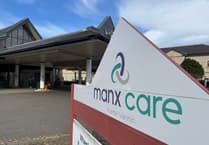Manx Care has ruled out charging for access to health services.
But the idea has been considered, the chief executive of Manx Care, Teresa Cope, said.
Speaking on Manx Radio’s Mannin Line show, Mrs Cope was asked by presenter Andy Wint whether the island should follow Jersey and Guernsey in charging for GP appointments and time spent in A&E.
Mrs Cope dismissed the idea, saying: ‘Manx Care has got some financial challenges, and so options such as charging patients for services is on our long list of considerations.
‘As a board, we even considered this at our last board [meeting] a couple of weeks ago.
‘We’re not minded at this moment in time to start charging the public for services, which should be free at the point of delivery. And that’s a basic principle of the NHS.
‘It’s [a route] we wouldn’t necessarily want to go down unless we absolutely had to, and I don’t think we’re at that point yet.
‘I would not want to charge our patients for services which I consider to be free at the point of delivery.’
Following the interview, some people questioned whether services would soon be charged for, as it was briefly considered, and some even took to Twitter to question Health Minister Lawrie Hooper.
In response, Mr Hooper rebutted the claims, and attacked the radio station’s professionalism, taking issue with its headline.
He said: ‘Free at the point of delivery is paramount and isn’t going anywhere.
‘Possibly the beginning of the end of Manx Radio interviews if they don’t learn to produce accurate headlines though…’
In another tweet, he added: ‘It looks like my whole week is going to be dealing with yet another issue caused by Manx Radio’s lack of professionalism.’
Manx Care was established following Sir Jonathan Michael’s 2019 independent review into the provision and delivery of health and social care in the Isle of Man.
All 26 recommendations were unanimously approved by Tynwald and are being delivered through the Health and Care Transformation Programme.
Within that same report, the idea of private health insurance was also discussed as one of a number of funding options to close the funding gap faced by the island’s health services.
It stated that if private insurance was used ‘only people earning less than the income tax personal allowance would be eligible for “free at the point of use” health and social care. Others could pay at the point of use and/or pay for private healthcare insurance through an insurer’.
Later on, the report did clarify that: ‘It is worth noting that, whilst private insurance is one of the most effective ways to reduce government spending on healthcare, it can increase the proportion of gross domestic product (GDP) spent on healthcare overall (both the USA and Switzerland spend more of their GDP on healthcare than the UK, for instance).
‘It is important to note, however, that private insurance for social care has been explored by the Isle of Man previously and was rejected as no provider would be willing to provide this insurance due to the high risks and small population involved.
‘Private insurance, therefore, is strictly an option for funding health care rather than health and social care.’


-(1).jpeg?width=209&height=140&crop=209:145,smart&quality=75)


Comments
This article has no comments yet. Be the first to leave a comment.